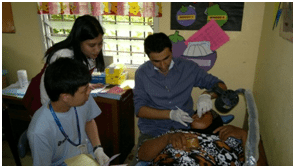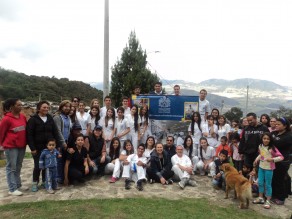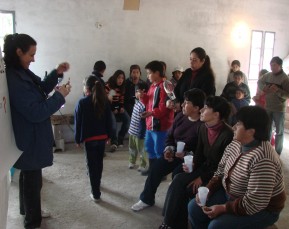MacJannet Prize 2013 Winners
First Place, receiving $7,500
IMU Cares Program, International Medical University (Malaysia)
The Kampung Angkat Project (KAP) [translated: Village Adoption Project] was initiated in 2007 as part of the International Medical Universi ty (IMU) Community Social Responsibility (CSR) under the banner of “IMU Cares” and in conjunction with IMU’s 15th anniversary as Malaysia’s first private medical university. Under the program, each of its three campuses adopted a village identified to have health and social issues and lacking in basic health facilities. The village identified for the IMU Clinical School in Seremban, was called Kampung Tekir, which was a village comprising of 500, mainly of indigenous people, of the Tenum ethnic group, 50% of whom were under 12 years old. At the time only part of the village had electricity and running water, and the nearest health clinic was 20 km away.
ty (IMU) Community Social Responsibility (CSR) under the banner of “IMU Cares” and in conjunction with IMU’s 15th anniversary as Malaysia’s first private medical university. Under the program, each of its three campuses adopted a village identified to have health and social issues and lacking in basic health facilities. The village identified for the IMU Clinical School in Seremban, was called Kampung Tekir, which was a village comprising of 500, mainly of indigenous people, of the Tenum ethnic group, 50% of whom were under 12 years old. At the time only part of the village had electricity and running water, and the nearest health clinic was 20 km away.
The purpose of the program was to enable medical and nursing undergraduate students to practice their knowledge and clinical skills in a rural setting. At the same time, the villagers would benefit from the presence of IMU students through regular free health checks and health education, the treatment of minor ailments, facilitation of referrals to appropriate health centers outside of the village when necessary, provision of free spectacles for visually impaired villagers and an opportunity for students and villagers to bond. IMU holds regular programs every 3-4 months, with one major program every year and several smaller programs. Each program was planned and executed by the students via a committee formed by the students. The KAP committee facilitates the programs by ensuring that permission and approval were obtained from the various governmental agencies. Learn More.
Second Place, receiving $5,000
Programa Social (PROSOFI), Pontificia Universidad Javeriana – Bogota (Colombia)
The Programa Social PROSOFI, established in 2010, is an academic initiative in the Engineering Faculty, inspired by the mission, educational project and Social Responsibility policy of the Pontificia Universid ad Javeriana. When the program was established, the first task was to look into what was already happening in the Faculty in terms of teaching, investigation and social service. Then, the next task was to define the community to focus in, for which a multivariate mathematical model was applied, taking into account social, economic and logistical criteria, as well as previous University presence and the interest of the community in involvement.
ad Javeriana. When the program was established, the first task was to look into what was already happening in the Faculty in terms of teaching, investigation and social service. Then, the next task was to define the community to focus in, for which a multivariate mathematical model was applied, taking into account social, economic and logistical criteria, as well as previous University presence and the interest of the community in involvement.
The community of Gran Yomasa-Bolonia in Usme was identified as the community to focus in during 2010-2016, and together university and community members identified six areas of focus: Work and Business Competition; Environment, Sanitation and Sustainable Development; Public Infrastructure, Housing and Community Development; Technological Communications Infrastructure; Comprehensive Social Development, Health and Coexistence; and Participatory Management, Local Development and Public Policies. The program aims to create a model that can be used for the benefit of both community and University development. Eventually the aim is to develop projects in multiple territories and to position PROSOFI as a flagship program and a reference for other universities on both a national and international level.
Third Place, receiving $2,500
Programa de intervención sanitaria en poblaciones vulnerables de la provincia de Córdoba, Universidad Católica de Córdoba (Argentina)
The Programa de intervención sanitaria en poblaciones vulnerables de la provincia de Córdoba (Programa de intervención), in English the Health Intervention Program for Vulnerable Populations in the Province of Córdoba, was established in 2007 in response to sanitary and health issues raise d by the community of Costa del Rio Pinto. The purpose of the program is to improve the quality of life of vulnerable populations with structural deficiencies that affect the high incidence and prevalence of communicable diseases, to implement health education as a means for generating behavior change at the individual, family and community, as well as a means to disrupt transmission routes of diseases associated with water and sanitation. The Programa de intervención is interdisciplinary, bringing together students and faculty members from three academic areas, biochemistry, pharmacy and veterinary medicine. Since the implementation of the program, illnesses in children were reduced by 45% and illnesses in animals were reduced by 56%.
d by the community of Costa del Rio Pinto. The purpose of the program is to improve the quality of life of vulnerable populations with structural deficiencies that affect the high incidence and prevalence of communicable diseases, to implement health education as a means for generating behavior change at the individual, family and community, as well as a means to disrupt transmission routes of diseases associated with water and sanitation. The Programa de intervención is interdisciplinary, bringing together students and faculty members from three academic areas, biochemistry, pharmacy and veterinary medicine. Since the implementation of the program, illnesses in children were reduced by 45% and illnesses in animals were reduced by 56%.
The Programa de intervención is being replicated in Cabildo, a slum in Córdoba, following the road map from Costa del Rio Pinto. In the first stage, the students conduct a participatory assessment and develop baseline to determine the epidemiological reality, customs, beliefs, habits and attitudes of the people. In a second step they investigate the prevalence of communicable diseases (parasitosis in children and animals, ITS, zoonoses) and drinking water quality. In the third stage, is diagnosis is designed and implemented participatory health intervention. Learn More.
Honorable Mentions
Service-Learning Research Scheme (SLRS), Lingnan University (Hong Kong)
Lingnan University was the first university in Hong Kong to launch the Service-Learning Research Scheme (SLRS) in 2004 and then established the Office of Service-Learning (OSL) in 2006, echoing the University’s motto – “Education for Services”. In Hong Kong, a fast-paced modern city where people are  becoming more apathetic of public affairs, SLRS takes up its mission to cultivate socially aware and readily responsive youths. It strives to engage students from all disciplines to delve into social issues not just from the textbook but also from their own hands-on experience in the community. With SLRS fully embedded in credit-bearing courses, students work closely with community partners to design and implement service projects that address the urging needs in the society, namely Poverty & Housing, Health & Aging, and Sustainable Development. Academic knowledge is translated into quality service through students’ active engagement, which creates a profound, mutually beneficial bond between the university and the community.
becoming more apathetic of public affairs, SLRS takes up its mission to cultivate socially aware and readily responsive youths. It strives to engage students from all disciplines to delve into social issues not just from the textbook but also from their own hands-on experience in the community. With SLRS fully embedded in credit-bearing courses, students work closely with community partners to design and implement service projects that address the urging needs in the society, namely Poverty & Housing, Health & Aging, and Sustainable Development. Academic knowledge is translated into quality service through students’ active engagement, which creates a profound, mutually beneficial bond between the university and the community.
From 2006 to 2013, 2,010 students have participated in 231 Service-Learning projects under SLRS, contributing 75,000 service hours to over 22,500 people. Throughout the years, students organized plenty of educational or empowerment programs for elderly, low income families, ethnic minority, new immigrants, disabilities, teenagers and children; drafted and implemented business plans for social enterprises; conducted surveys and research on various topics; taped promotion videos for NGOs; and completed oral history writing projects for elderly, historical heritages and SARS period. Learn More.
Humnawa, Beaconhouse National University (Pakistan)
In September 2010, the Punjab Skill Development Fund at Beaconhouse National University developed the Humnawa program in collaboration with the Sungi Development Foundation and the Bunyad Foundation. The program is run by 13 students in the textile and jewelry department under the close supervision of two faculty members, with a larger faculty pool serving as the advisory board. The main objective of the program is to create sustainable empowerment for members of eight communities in Muzzafargarh and surrounding areas.
collaboration with the Sungi Development Foundation and the Bunyad Foundation. The program is run by 13 students in the textile and jewelry department under the close supervision of two faculty members, with a larger faculty pool serving as the advisory board. The main objective of the program is to create sustainable empowerment for members of eight communities in Muzzafargarh and surrounding areas.
Each of the 200 women involved in the program were interviewed prior to the start of the program so they could express the barriers they face and their expectations for the program. The program informs artisans and community members about home based workers rights, fair wages and opportunities for home based workers as well as providing product exhibitions in Lahore and Islamabad, which aim to elevate artisan confidence and earnings. After completion of the Humanwa , the beneficiaries should be able to continue their income generating activity without support from the outside. Learn More.